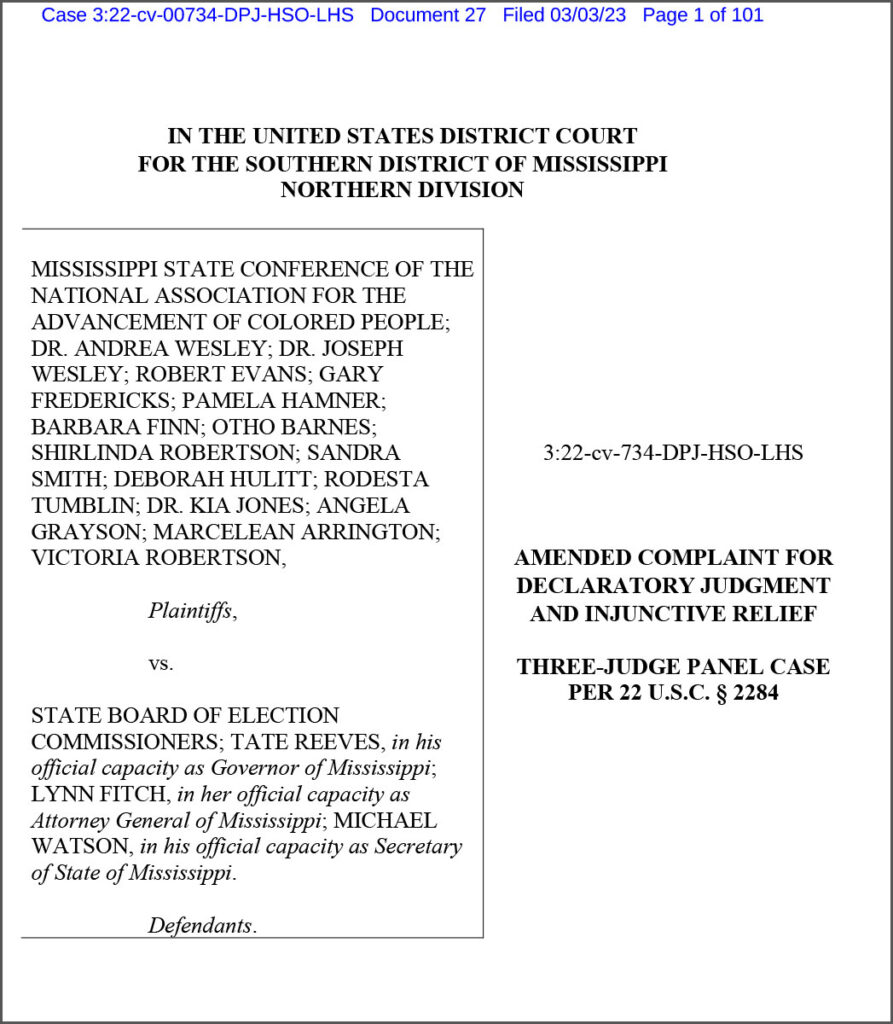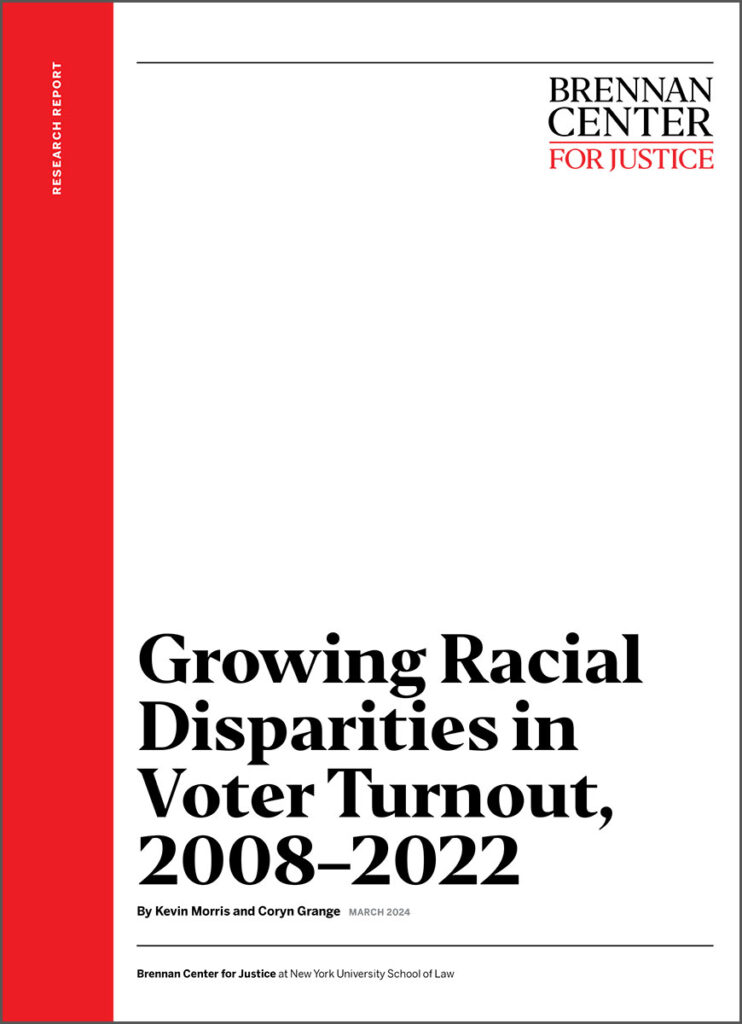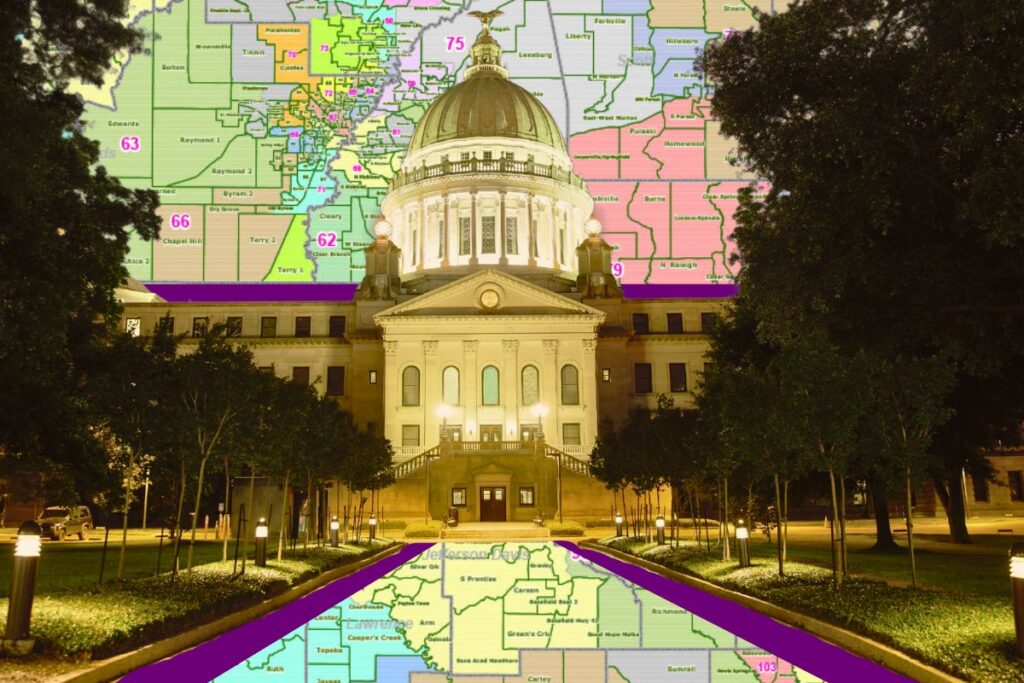JACKSON, Miss.—Attorneys arguing that Mississippi’s state House and Senate maps are illegal racial gerrymanders are making closing arguments this week in front of a three-judge panel in the U.S. District Court for the Southern District of Mississippi in Jackson.
The case, Mississippi State Conference of the NAACP v. the State Board of Election Commissioners, centers around the legislative maps the Mississippi Legislature drew in 2022.
The civil rights organization and several Mississippians first filed a lawsuit against the state on Dec. 20, 2022, over the maps that they allege dilute the voting power of the state’s Black population, violating both the Voting Rights Act of 1965 and the 14th Amendment of the U.S. Constitution.
“Mississippi has the largest Black population percentage of any state in the nation. Black Mississippians comprise about 38 percent of the State’s residents (based on the Census Bureau’s “Any Part Black” category) and Mississippi’s Black population continues to grow,” the lawsuit states.
“The new maps are only the latest in a long and unfortunate history of manipulating the districting process to undermine Black voters’ political power,” the lawsuit continues. “Because they violate federal law and the U.S. Constitution, Mississippi’s new districting maps should be enjoined, and lawful maps that fairly represent Black voters and all Mississippians should be ordered into place.”
State: Days of Voter Intimidation ‘Behind Us’
The gerrymandering trial is set to end Friday but the judges could take weeks to return a decision. The judges include Chief District Judge Daniel P. Jordan III, District Judge Halil S. Ozerden and Circuit Judge Leslie Southwick; Republican former President George W. Bush appointed all three to the bench.

The lawsuit specifically targets the following districts:
VRA Section 2 Jurisdictions
- DeSoto County area (SD 2)
- Hattiesburg area (SD 45)
- Northeastern MS—Chickasaw/Monroe County area (SD 17, HD 22)
- South Central MS—Copiah/Simpson/Lincoln/Jefferson Davis County area (SD 35)
- Western Hinds County area near Clinton (HD 56)
- East Central MS—Clarke, Jasper, Newton County area (HD 84)
Racial Gerrymandering Jurisdictions
- SD 2
- SD 48 (Gulfport area)
- HD 22
- HD 34 (Grenada area)
- HD 64 (Eastern Hinds/Madison County area)
“The most litigated section of the VRA, Section 2 prohibits any voting law, practice or map that results in the “denial or abridgment of the right of any citizen of the United States to vote on account of race or color,” the Democracy Docket states. “This provision provides a mechanism for challenging laws and maps that were enacted with a discriminatory purpose or have a discriminatory impact.”
A violation of Section 2 of the Voting Rights Act was the crux of arguments in the case of Allen vs. Milligan in Alabama, where Black voters and civil rights organizations sued the state over congressional district maps.
ACLU of Mississippi Executive Director Jarvis Dortch, a former Democratic state lawmaker, told the Mississippi Free Press on Feb. 27 that voters in several Mississippi districts are facing a similar fight.
“I think there are areas in the state where the Legislature went out of its way to pack Black voters into a select number of districts instead of allowing them to be spread out and have more influence in our districts throughout the state,” he said.
“Take Hattiesburg for instance,” he continued. “It’s a majority-Black city but all its state senators are white because most of the Black community in Hattiesburg has been put in a Senate district that’s based in another county.”

The complaint states that “Mississippi’s Black population could support at least four additional Black-majority Senate districts and at least three additional Black-majority House districts in several areas across the State, where Black voters, despite their numbers, and despite voting cohesively, have previously been unable to elect candidates of their choice, in large part due to the prevalence of racially polarized voting.”
“Specifically, new Black-majority Senate districts could have been drawn to prevent vote dilution in the DeSoto County area; the Golden Triangle area; the South-Central Mississippi area near Copiah, Simpson, and Jefferson Davis counties; and the Hattiesburg area,” the lawsuit says.
The lawsuit continues, saying that “Black-majority House Districts could have been drawn to prevent vote dilution in the Western Hinds County area, the area north of the Golden Triangle between West Point and Tupelo, and the area between the Cities of Laurel and Meridian, in and around Jasper and Clarke counties.”
The ACLU alleges that the Legislature drew the maps in a way that gives white Mississippians more power to elect the candidates of their choice. However, attorney Tommie Cardin, representing the state, said on the opening day of the trial that despite the state’s history, Mississippians vote along party lines—not racial lines, the Associated Press’ Emily Wagster Pettus reported on Feb. 26.
“The days of voter suppression and intimidation are, thankfully, behind us,” Cardin said.
‘Change Does Happen But You Have To Force It’
The NAACP’s lawsuit against Mississippi is one of several that activists across the country have filed over the past decade challenging congressional and legislative maps drawn after the U.S. Supreme Court’s 2013 decision in the case of Shelby County v. Holder, which voided the preclearance clause of Section 5 of the Voting Rights Act. The preclearance clause required jurisdictions “with a history of discrimination to obtain approval from the Department of Justice or a court before changing voting rules.”

A March 2, 2024, report from the Brennan Center for Justice found that after the Shelby County decision, the national gap between turnout for white voters and Black voters grew by eight percentage points between 2010 and 2020.
“That gap has grown faster in the places that, until the Supreme Court’s Shelby County v. Holder decision, had been covered by Section 5 of the Voting Rights Act, which provided for federal oversight to ensure that voting changes were not discriminatory. … In 2020, the racial turnout gap was more than 12 percentage points. For Black voters, it was almost 15 percentage points. Had voters of color voted at the same rate as white voters, 9 million more ballots would have been cast. In 2022, the racial turnout gap was 18 percentage points, meaning 14 million more ballots would have been cast.”
If the three-judge panel ruled in favor of the NAACP’s complaint in the Mississippi case, the state could have to redraw the districts at the center of the lawsuit to equitably represent the areas’ populations. Dortch said he believes a legal win would inspire other Mississippians to continue fighting to preserve voting rights.
“If we’re successful, my hope is that people look at this like, ‘fighting is worth it.’ Change does happen but you have to force it,” Dortch said. “Especially in places like Mississippi. It’s not going to happen just based on our demographics. It’s going to happen when we work together to make it happen.”
The Mississippi Free Press reached out to state attorneys Tommie Cardin and Brian Parker Berry but they did not respond to requests for comment.










